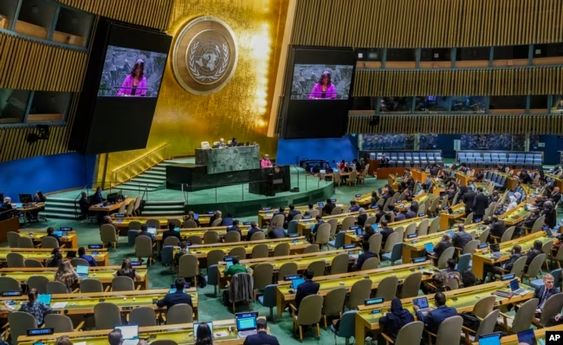World
UN Calls for Humanitarian Truce as Aid to Gaza Collapses

Israel increased its military ground operations on Friday night in response to calls from around the world for an emergency humanitarian ceasefire and a warning from U.N. leaders that the Gaza Strip’s humanitarian situation was on the verge of catastrophic collapse.
In a statement, Secretary-General Antonio Guterres of the United Nations remarked, “Misery is growing by the minute.” “The people of Gaza will face an unprecedented avalanche of human suffering unless there is a fundamental change.”
Only on October 21 did some limited humanitarian aid begin to reach the Gaza Strip, which is under Hamas control. Even so, it has been delayed, irregular, and insufficient to meet the growing demands. Despite the acute need for fuel, Israel has banned its imports, claiming that it is stockpiling vast amounts of fuel for military reasons and that Hamas will use the fuel for its war machine.
Without a “immediate and fundamental shift” in the way aid was entering Gaza, Guterres stated that the UN would not be able to continue delivering it. He claimed that in order to check trucks more quickly, the system for inspecting products at the Egyptian border had to be changed.
He uttered, “Everyone has to take responsibility for their actions.” “This is a crucial moment.” We are being judged by history.
The Gaza Strip is home to over 2.2 million people, of whom the UN estimates that over 1.4 million have been forced to from their homes as a result of the hostilities that broke out after Hamas carried out a terror attack on Israeli towns and cities on October 7, which resulted in the deaths of 1,400 people. An organisation classified as a foreign terrorist by the US is Hamas.
Gazans are being “strangled,” the president of the U.N. organisation that aids Palestinian refugees said earlier on Friday in Jerusalem.
The commissioner general of the United Nations Relief and Works Agency, Philippe Lazzarini, said reporters that “people in Gaza are dying as we speak.” “The only things killing them are bombs and strikes. The consequences of [the] siege imposed on the Gaza Strip will soon claim many more lives. Essential services are failing. Medicine is becoming scarce. Water and food are becoming scarce.
Humanitarian ceasefire
On Friday, the U.N. General Assembly passed a resolution advocating for a humanitarian cease-fire with overwhelming support.
READ ALSO: US “entering battle” against Hamas in Gaza
The declaration, put forth by Jordan on behalf of the Arab states, asks for “an immediate, durable and sustained humanitarian truce leading to a cessation of hostilities,” among other things, so that aid can be safely delivered to Gaza and all detained civilians can be freed.
The outcome of the vote was enthusiastically greeted by the General Assembly: 120 countries voted in favour, 14 against. The two-thirds majority needed for adoption was not met by the 45 abstentions. The resolutions passed by the body represent the consensus of the global community but are not legally enforceable.
Before the vote, there was a protracted debate during which Canada proposed an amendment aimed at improving the balance of the Jordanian draught. It demanded the quick release of the hostages and denounced the terror attack by Hamas. The assembly decided not to include it.
Although it did not vote for the resolution with the amendment removed, the United States did support the Canadian amendment.
Following the vote, Israel’s envoy, Gilad Erdan, remarked, “This ridiculous resolution has the audacity to call for a truce.” “The truce imposed by this resolution is intended to allow Hamas to burn us alive by forcing Israel to stop defending itself against them.”
He declared that Israel was keeping a careful eye on Gaza’s humanitarian condition.
According to international humanitarian law, we also know that there isn’t a humanitarian catastrophe. He made reference to the Islamic State terror group when he added, “Trusting the reports coming out of Gaza is exactly like trusting reports from ISIS.”
The Gaza health ministry, under Hamas control, reports that over 7,000 Palestinians have died and over 18,000 have been injured. It is not possible to independently confirm those figures.
After the Security Council rejected a similar resolution urging a humanitarian cease-fire, the General Assembly called a special meeting. The council deliberated over four separate texts, but none of them received the required amount of support or were overridden by vetoes.
The Israel Defence Forces declared they were increasing their ground operations in Gaza while the assembly was casting its decision, and there were reports of significant airstrikes from the region.
On the social media site X, Lynn Hastings, the U.N. resident and humanitarian coordinator for the Palestinian territories, stated that phone, internet, and mobile networks have been shut off to Gaza, making it impossible for U.N. officials to get in touch with relief workers there.
